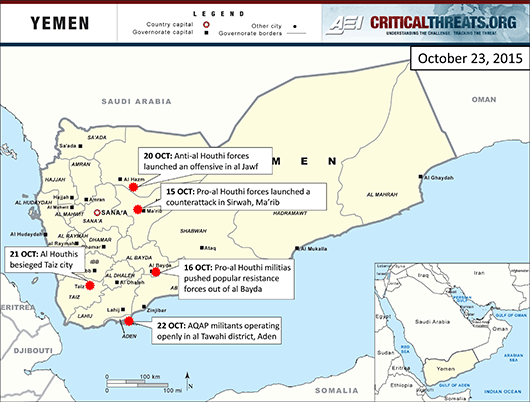Al Qaeda in the Arabian Peninsula (AQAP) is taking control of more territory in Yemen, both inside and outside of active conflict zones. The decentralization of the conflict in Yemen continues to delay a negotiated settlement and provide opportunities for AQAP to expand.
AQAP is taking advantage of a security vacuum in Aden to strengthen its presence in the city. AQAP militants are a visible presence in al Tawahi, one of the largest districts in Aden. AQAP’s flag was raised over the district police station and openly displayed on some cars in recent weeks. The coalition-backed Yemeni government does not have enough well-trained forces to secure Aden, and locals reported AQAP’s presence is growing in the city. President Abdu Rabbu Mansour Hadi is attempting to bolster Aden’s security by incorporating popular resistance fighters into the national security forces and recalling Yemeni police cadets from Saudi Arabia and the UAE. Sudanese troops reinforced coalition forces in Aden, but a UAE Special Forces unit remains the only trained counterterrorism force on the ground. The Hadi government is attempting to mask the security breakdown by denying reports of AQAP and Islamic State of Iraq and al Sham (ISIS) activity in the city. Hadi government officials denied reports of a vehicle-borne improvised explosive device that killed nine Sudanese soldiers near Aden International Airport. Similarly, both the coalition and the government continue to blame al Houthi rockets for an October 6 coordinated bombing by ISIS Wilayat Aden-Abyan.
President Hadi committed to UN-led peace talks, but the Saudi-led coalition will likely delay a settlement until it secures a superior position on the ground. President Hadi’s government agreed to participate in negotiations in Geneva at the end of October after initially dismissing an al Houthi-proposed peace plan. International pressure likely pushed the Hadi government to commit to talks, but the success of a negotiated settlement remains tied to the objectives of the Hadi government’s Arab coalition allies. A Saudi-led coalition spokesman stated that the coalition will continue military operations in Yemen in the absence of an official peace resolution, and that ceasing operations at this time would be “premature.”
The anti-al Houthi frontlines in Taiz and Ma’rib governorates remain fixed. The al Houthis continued to besiege popular resistance forces and residential neighborhoods in Taiz city as humanitarian conditions deteriorate. Clashes continued along the Taiz-Lahij border and al Houthi forces regrouped near Taiz’s Bab al Mandeb coastal region, which was recently recaptured by coalition-backed forces. The anti-al Houthi line remains fixed near Sirwah, Ma’rib as coalition-backed forces fend off an al Houthi counterattack.
Pro-al Houthi militias launched an offensive southeast of Sana’a. Pro-al Houthi militias pushed popular resistance forces out of al Bayda governorate and are preparing to launch an offensive in neighboring Shabwah governorate. Coalition airstrikes in Shabwah increased, likely in response to al Houthi mobilization there.
Anti-al Houthi forces launched an offensive in al Jawf governorate in northern Yemen. Popular resistance fighters and Yemeni army units loyal to President Hadi advanced toward a strategic al Houthi-held military camp with air support from the Saudi-led coalition. These forces are attempting to impose a blockade on al Hazm, the al Houthi-held capital of al Jawf. This offensive may be in response to the shipment of al Houthi weapons from al Jawf to Ma’rib, where the al Houthis are currently fighting to regain territory from coalition-backed forces.
The entrenchment of existing frontlines and the initiation of new offensives will stall the coalition’s push toward Sana’a. The coalition’s inability to secure superior positions on the ground will continue to delay its support for a negotiated settlement. AQAP will take advantage of the ongoing security vacuum to consolidate its gains in Aden and threaten the Hadi government’s ability to retain control of the city.
← PREVIOUS |
NEXT → |

